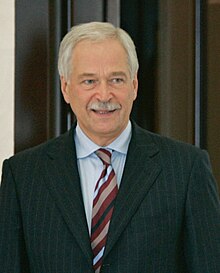Boris Gryzlov
| Boris Gryzlov Борис Грызлов |
|
|---|---|

Boris Gryzlov in 2010
|
|
| Chairman of the Supreme Council of United Russia |
|
|
Assumed office 27 November 2004 |
|
| Chairman of the State Duma | |
|
In office 29 December 2003 – 14 December 2011 |
|
| Preceded by | Gennady Seleznyov |
| Succeeded by | Sergey Naryshkin |
| Chairman of United Russia | |
|
In office 15 April 2005 – 31 December 2007 |
|
| Preceded by | Sergey Shoygu |
| Succeeded by | Vladimir Putin |
| Minister of Internal Affairs | |
|
In office 28 March 2001 – 24 December 2003 |
|
| Preceded by | Vladimir Rushaylo |
| Succeeded by | Rashid Nurgaliyev |
| Parliamentary leader of United Russia in the State Duma | |
|
In office 7 December 2003 – 24 September 2011 |
|
| Succeeded by | Andrey Vorobyov |
| Personal details | |
| Born |
Boris Vyacheslavovich Gryzlov December 15, 1950 Vladivostok, Soviet Union |
| Nationality | Russian |
| Political party | United Russia |
| Spouse(s) | Ada Viktorovna Gryzlova |
| Children | Dmitry (1979) Evgeniya (1980) |
| Religion | Russian Orthodox |
| Signature |  |
Boris Vyacheslavovich Gryzlov (also spelled Grizlov; Russian: Борис Вячеславович Грызлов, Russian pronunciation: [bɐˈrʲis ɡrɨzˈlof]) (born December 15, 1950), is a Russian politician and was the Speaker of Russia's State Duma (the lower house of parliament) from 29 December 2003 to 14 December 2011. He is one of the leaders of the largest Russian political party, United Russia. Boris Gryzlov is a close ally of Russian President Vladimir Putin.
Gryzlov was born in Vladivostok but was raised in Leningrad (Saint Petersburg). He graduated from the Leningrad Electrical Institute of Communications in 1973 and worked as a radio engineer. From 1977 to 1996 he worked his way up from being an engineer to division director in the Elektronpribor plant. He was not a public figure before 1999. In October 1999 he became head of the St Petersburg regional branch of Sergey Shoygu's Unity party and in December 1999 he was elected to the Russian Duma running on the Unity party ticket. In January 2000 he was elected chairman of the Unity fraction in the Duma.
In March 2001 he was appointed to the post of chief of Russian police and became Russia's Interior Minister. In this position Gryzlov proclaimed that the fight against terrorism and corruption were his priorities.
Gryzlov supported the Kremlin's policies in Chechnya and won the reputation of being a trusted and loyal supporter of the Russian president.
In August 2001 Boris Gryzlov claimed that up to 100 industrial enterprises in Saint Petersburg, including the Petersburg Fuel Company, a leading gasoline retailing operator in the city, as well as the four main sea ports of Northwestern Russia, Saint Petersburg, Kaliningrad, Arkhangelsk and Murmansk, were controlled by the Tambov Gang. In May 2002 he sent a commission to St. Petersburg to investigate corruption allegations in the city's gasoline market. The investigation was initiated after the Faeton Gasoline Company, the second leading fuel retailing company in the city, had complained to both Gryzlov and the Prosecutor General's Office in April that the Saint Petersburg City Administration had given preferential treatment to the Petersburg Fuel Company.
...
Wikipedia
